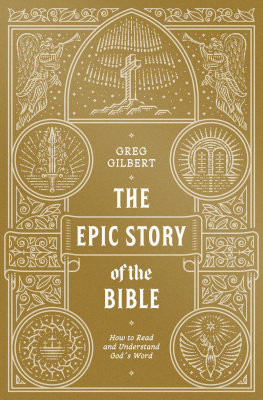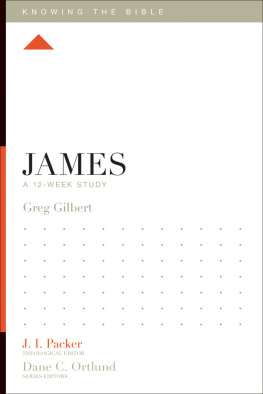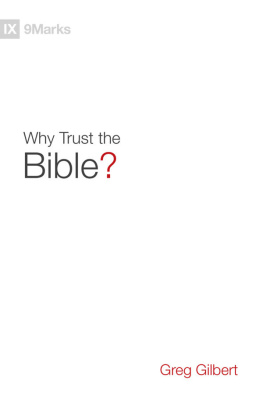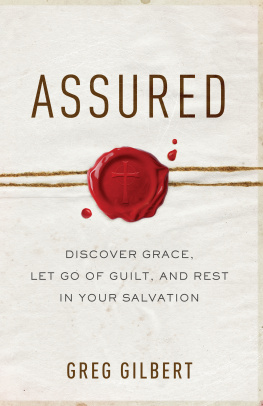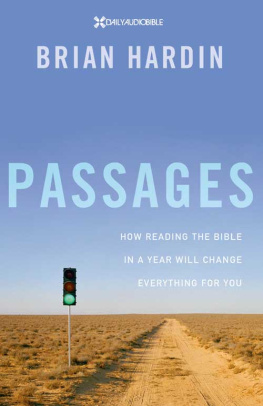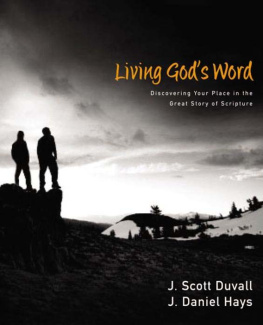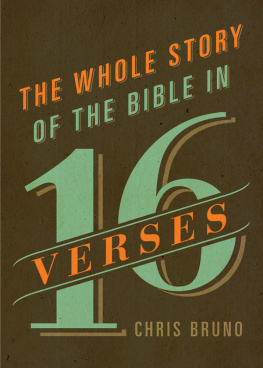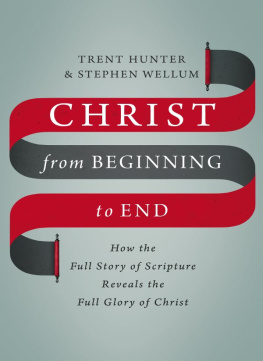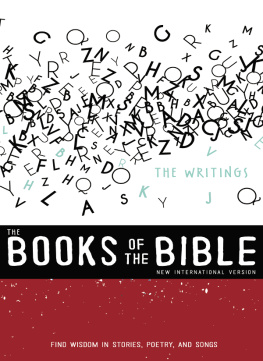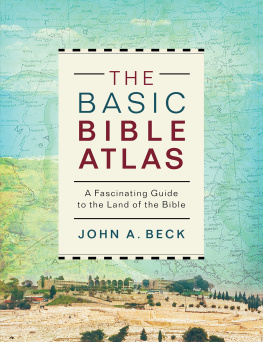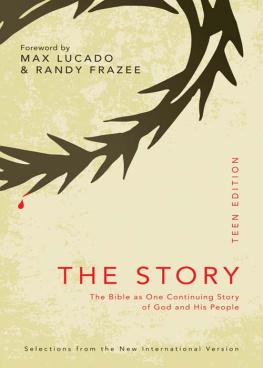Table of Contents
Landmarks
Greg Gilbert is a world-class expositor. (Trust me; I got to sit under his preaching for nearly twelve years.) The Epic Story of the Bible will revolutionize your ability to grasp the sweeping, soaring narrative that centersfrom Genesis to Revelationon Jesus the King. Read and marvel.
Matt Smethurst, Lead Pastor, River City Baptist Church, Richmond, Virginia; Editor, The Gospel Coalition; author, Deacons and Before You Share Your Faith
I sometimes worry when we try to identify the Bibles major theme or core message since the Bible is more like a rich ecosystem of themes working together to offer us a picture of God and his glory. However, in this very readable book, Greg Gilbert brings together important biblical themes to help Christians, whether new to or seasoned in the faith, understand Gods word. With a good command of biblical themes, helpful illustrations, and personal anecdotes along the way, Gilbert shows himself to be a clear and accessible guide for Gods people.
Mark Jones, Pastor, Faith Vancouver Presbyterian Church, British Columbia, Canada
This is a resource that equips us to be better Bible readers and infuses delight in Gods redemptive work. What a gift! Greg Gilbert skillfully leads us over the terrain of Scripture, helping us grasp its sweeping story and biblical themes. It will be a great asset to the training work of churches and organizations in how to study the Bible and rejoice in our Savior and King.
Taylor Turkington, Director, BibleEquipping.org
I am thrilled about Greg Gilberts guide to exploring the story of the Bible. This provides the essentials we need to get startedan overview of the Bibles intricate and epic storyline, along with its central themes. I am eager to see how this helps many engage the Bible with eagerness and understanding.
Drew Hunter, Teaching Pastor, Zionsville Fellowship, Zionsville, Indiana; author, Made for Friendship
The Theme of Kingship
You are probably already noticing that the various themes that weave in and through the storyline of the Bible are not at all independent of one another. In many ways they build on each other and reinforce one another, much as the various strands of a rope are not one and the same, but weave around one another and thereby strengthen one another. For example, the theme of Gods presence is tightly bound up with the theme of covenant because it is precisely by putting himself in covenant with his people that God comes to dwell with them, and it is by the breaking of that covenant that the people forfeit Gods presence. Similarly, at the end of the last chapter it became obvious that the theme of covenant was becoming tightly bound up with the theme of this chapterkingship. Indeed once God inaugurated the Davidic covenant, the kingship became the sole and very means by which the covenantsall of themwould be brought to fulfillment.
Another thing youve probably begun to notice, as weve been tracing these themes, is that we tend to return repeatedly to the same mountaintop texts. Thats not super surprising. After all, as in any epic story, some moments in the Bibles narrative manage to push several themes forward all at the same time. In fact, those moments are recognized as the highest and most important points of the story. The creation of human beings in Genesis 1 and their fall into sin in Genesis 3, for example, are the launching points for virtually all of the Bibles greatest themes. In the same way, the cutting of the covenant with David pushes forward both covenant and kingship. And its not surprisingin fact its the whole point of the entire epic storythat all the great themes of the Bible find their landing place in the life and person of Jesus Christ.
So the themes of the Bibles storyline are deeply interrelated and mutually reinforcing. But I hope youre also learning that their interrelatedness does not mean that they are indistinguishable. Each of the themes were tracing in this bookand others that we are nothas its own unique course, its own distinctive shape and direction and development that readers of the Bible can trace individually. And even though the various themes often share some of the grand storys high pointsthey meet, at times, on well-known mountaintopseach of them also has high points all its own, moments in the story that uniquely and specially push that theme forward. All that speaks to the beautiful richness and multilayered complexity of the Bible; you really could read it from start to finish a dozen times and, depending on which theme youve chosen to trace, feel like youve embarked on a newif relatedadventure. And yet again, none of those themes stands alone. They all weave and fold together into the one grand and epic story of the Bible.
I say all that now because in this chapter, and even more in the next, youll start to see more clearly how the Bibles themes interact with one another and layer on top of each other, how they exert pressure on each other and push each other onward. In fact, you could even argue that the theme this chapter traceskingshipis the central theme in the story, the one without which the others simply cannot cohere. The significance of the kingship theme is apparent even in the most common appellation given to Jesus in the New Testament: he is Jesus Christ , which is not (contrary to far too much common misunderstanding!) his last name, but rather his title. Christ is simply the Greek translation of the Hebrew word Messiah , which originally meant anointed one and could apply to anyone who was anointed with oil, but which eventually became a descriptor of the most central anointed one of allthe king. So Jesus Christ simply means (in a Rohan-sounding kind of way), Jesus King. Thats where the theme of kingship ends, glittering on the royal brow of the King of kings.
The Garden Needs a King
But it begins, unsurprisingly, in Eden. In the last chapter we looked at Genesis 1:2628, Gods declaration that he was going to create human beings as his image and likeness. There we saw that both those words are covenantal in nature, likeness referring to a father-son relationship between God and humans and image referring to humanitys right and responsibility (by virtue of that father-son relationship) to rule creation under God. That responsibility to rule is made explicit in verse 26, where God says, And let them have dominion over the fish of the sea and over the birds of the heavens and over the livestock and over all the earth and over every creeping thing that creeps on the earth, and then again in verse 28 when he reiterates the same idea: And God said to them, Be fruitful and multiply and fill the earth and subdue it, and have dominion over the fish of the sea and over the birds of the heavens and over every living thing that moves on the earth. The word dominion in those verses is just what it sounds like. As the one who, uniquely among all created beings, has been created as Gods likeness and image, Adams very job (and Eve would shortly join him in this) was to rule creationstarting in Eden, but eventually extending out from there until the whole world is subdued under his, and therefore Gods, rule.
If you think about it, the work God was doing here was beautiful. He was building a structure of authority into his creation wherein Adam and Eve would rule over the rest of creation, Adam would exercise leadership in his relationship with Eve, and ruling over it all in high splendor would be the Creator himself, the Lord, the high King of the universe. Its important to see here that although God gave Adam and Eve dominion over creation, their rule was not ultimate. If God was the high King, they were merely his vice-regents, and therefore their authority and dominion were derived; they were secondary; and they were therefore limited. Thats the meaning of the tree God set in the middle of the garden, and the reason he told Adam and Eve that they could not eat of its fruit. It was a reminder to them that there was a higher crown than their own, a higher ruler who could command and limit them.

